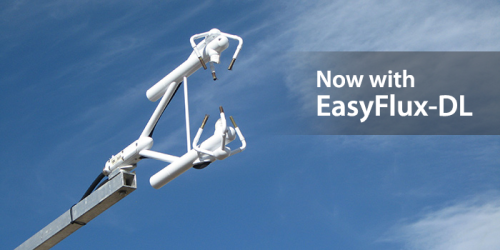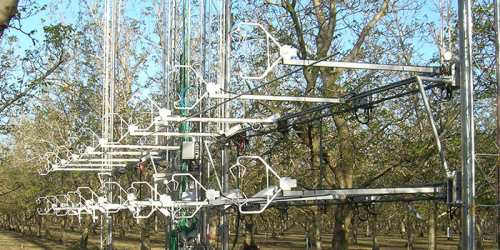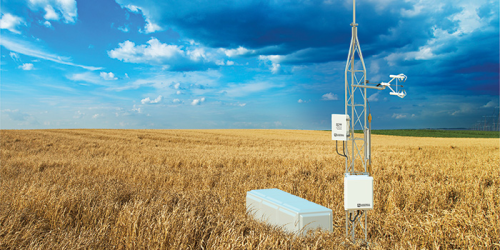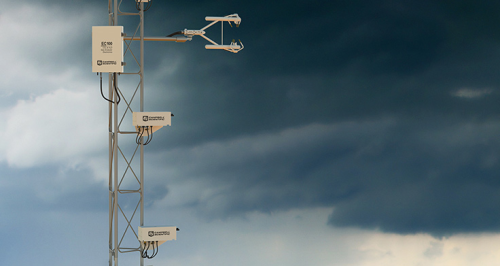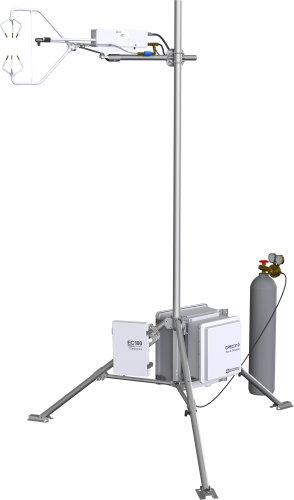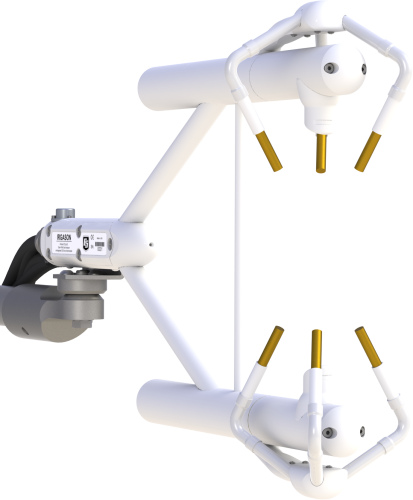How We Can Help You
Campbell Scientific offers a variety of micrometeorological systems for measuring turbulence and fluxes of greenhouse gases (CO2, H2O, CH4, N2O, and CO2 isotopes) and energy (sensible heat, latent heat, and momentum). We offer the lowest total system power available for open-path (5 W) and closed-path (12 W) eddy covariance over the entire instrument operating temperature. This, combined with our ruggedized designs and low-maintenance operation, makes our systems the ideal choice for sites in remote or challenging conditions. We are unique among flux system providers in that we manufacture all key system components: 3D sonic anemometers, gas analyzers, sampling systems, and data loggers. This enables us to make our systems much more highly integrated, taking into account important system-level considerations such as sensor colocation and mounting, high-speed measurement synchronization, sensor aerodynamics, and whole-system frequency response. Finally, our patented colocated design of the IRGASON is the only open-path CO2/H2O gas analyzer that allows for flux calculations using instantaneous point-by-point conversion to CO2 mixing ratio, which eliminates the need to correct for density effects on the measurement.
Learn moreTo see how our systems meet your application needs, review our case studies »
More Details about Our Gas Flux and Turbulence Systems
Add energy balance or biomet sensors, such as:
| HMP155A-L Temperature and Relative Humidity Probe |
 |
| NR-LITE2-L Net Radiometer |
 |
| NR01-L 4-Component Net Radiometer |
 |
| CNR4-L 4-Component Net Radiometer |
 |
| TCAV-L Averaging Soil Thermocouple Probe |
 |
| CS616 Water Content Reflectometer |
 |
| CS650 30 cm Soil Water Content Reflectometer |
 |
| CS655-L 12 cm Soil Water Content Reflectometer |
|
| HFP01-L Soil Heat Flux Plate |
 |
| HFP01SC-L Self-Calibrating Soil Heat Flux Plate |
 |
Documents
Brochures
- CPEC300, CPEC306, and CPEC310 Closed-Path Eddy-Covariance Flux Systems
- IRGASON Integrated CO2 and H2O Open-Path Gas Analyzer and 3D Sonic Anemometer
- EC150 CO2 and H2O Open-Path Gas Analyzer with Optional 3D Sonic Anemometer
- AP200 CO2/H2O Atmospheric Profile System
- CSAT3B 3-D Sonic Anemometer with Integrated Electronics
- EasyFlux DL Eddy-Covariance Data Logger Program
- EasyFlux PC Eddy Covariance Post Processing PC Software
- EasyFlux Web Eddy-Covariance Browser-Based Software
Technical Papers
Case Studies
Understanding the spatial variability of the Earth’s atmospheric boundary layer—including the surface layer near the......read more
Overview In the fight against climate change, innovative solutions are emerging to address the global challenge......read more
The Utah Geological Survey, supported by the Utah Division of Water Rights, has constructed a......read more
This case study discusses the integration of CPEC310 and AP200 systems to explore the theories......read more
The Warra long-term ecological research (LTER) site located in Southwestern Tasmania was founded in 1995......read more
The cultivation of rice—the staple food for India, as well as for approximately half the......read more
Forest habitats contribute more than any other terrestrial biome to carbon cycles and processes. It......read more
Scientists and land-use managers have long recognized the importance of forest lands for their role......read more
Frequently Asked Questions
Number of FAQs related to Gas Flux and Turbulence: 1
-
Most Campbell Scientific systems are built from individual components. This provides maximum flexibility for our customers, but it does not lend itself to pricing a "typical" system. Contact Campbell Scientific for assistance in pricing a system to meet the unique needs of the application.
Integrators and Consultants
Upcoming Events
-
AGU Chapman Conference 2025
September 15-19, 2025 | Boulder, CO
Associated Links
Articles and Press Releases
Newsletter Articles
- China Flux Cooperation 05-15-2019
- Coming Soon: New CPEC300-Series Closed-Path Eddy-Covariance Systems 01-24-2018
- A New Software Suite for Campbell Scientific Integrated Eddy-Covariance Systems 07-17-2017
- Newly Designed EC155 and CSAT3A Reduce Maintenance and Improve Measurements 02-02-2016
- EasyFlux-DL Datalogger Program on the Way 10-15-2015
- Micromet News 04-14-2015
- Case Study: Alaska Eddy-Covariance Project 10-15-2013
Press Releases
- Innovative Carbon Monitoring Sensor Issued a U.S. Patent: Campbell Scientific’s IRGASON receives U.S. patent 04-29-2013
- New Open-Path Analyzer for Eddy-Covariance Flux Measurements 06-25-2010
- New Closed-Path Gas Analyzer for Eddy-Covariance Flux Measurements 06-25-2010
- Faster and Flexible: Campbell Scientific’s CR3000 Micrologger® 10-01-2005
Privacy Policy Update
We've updated our privacy policy. Learn More
Cookie Consent
Update your cookie preferences. Update Cookie Preferences




